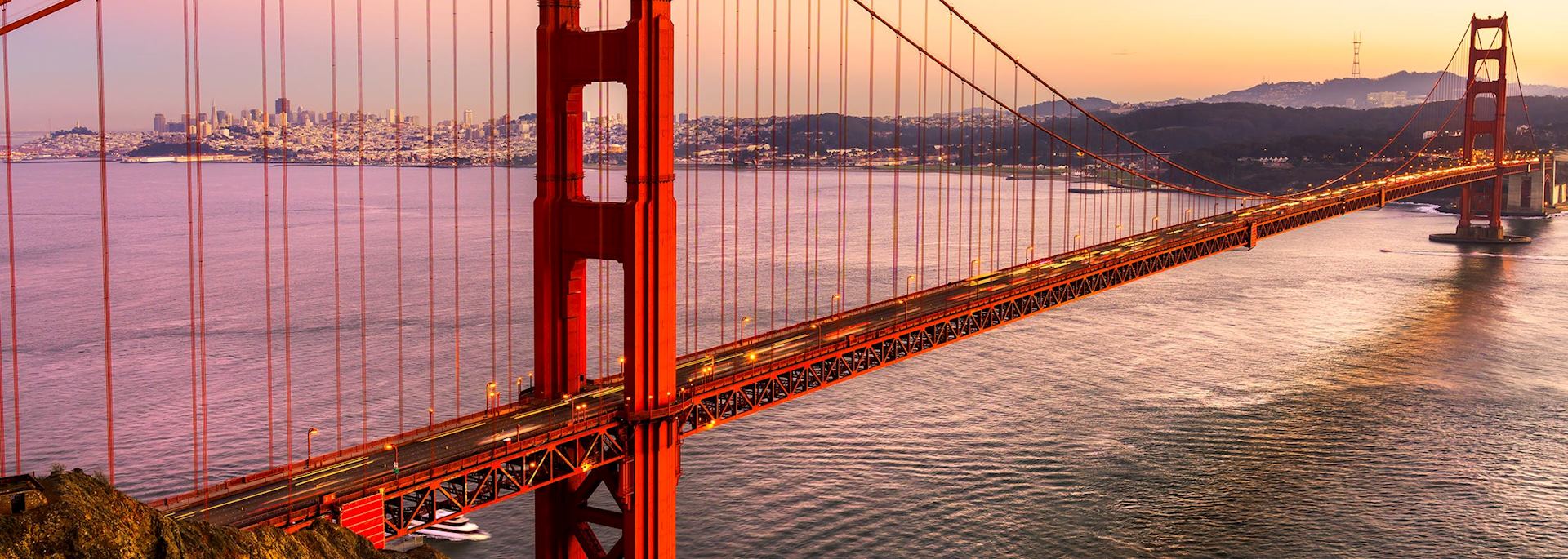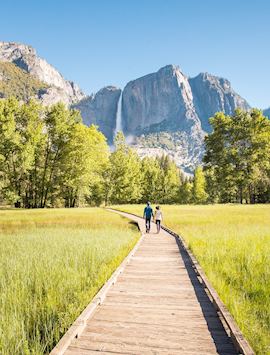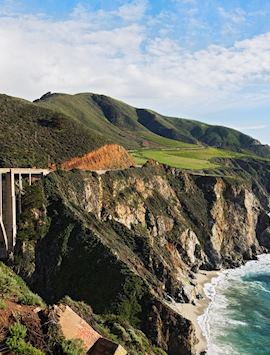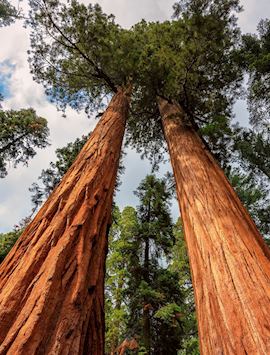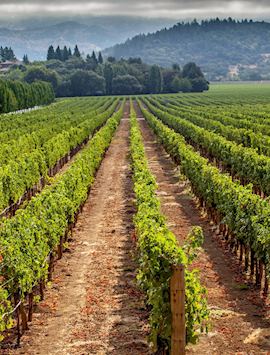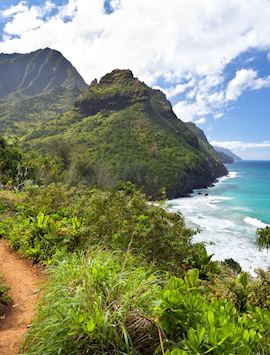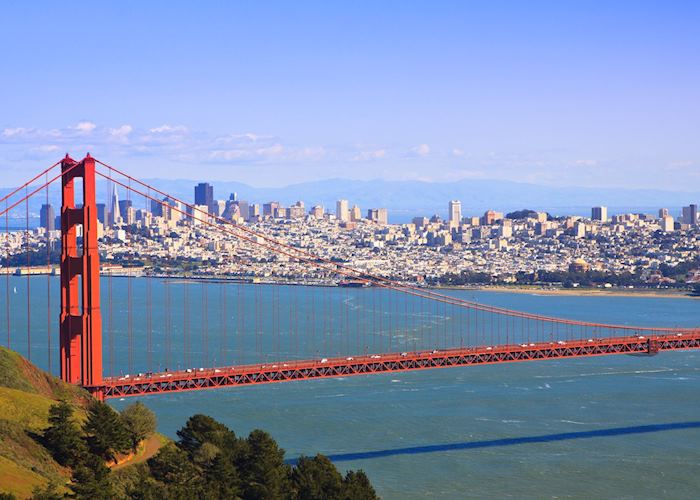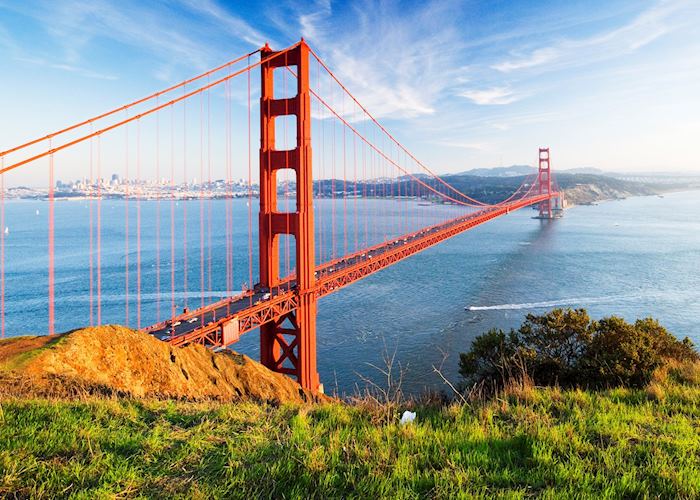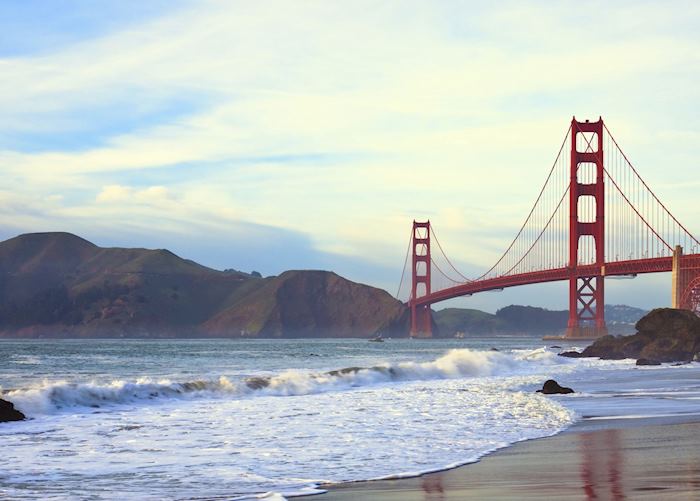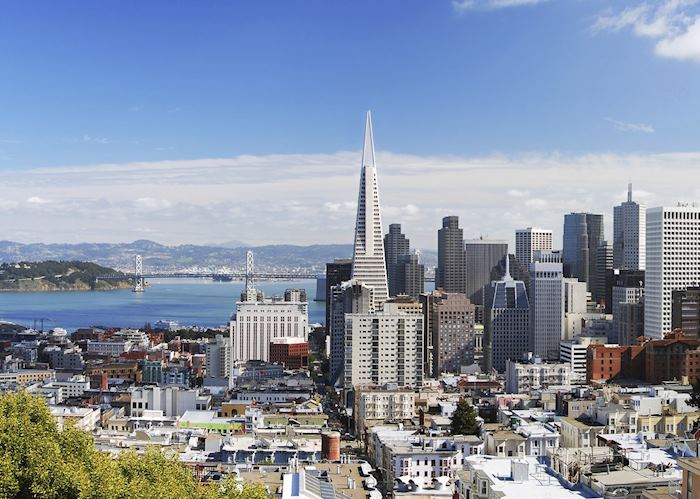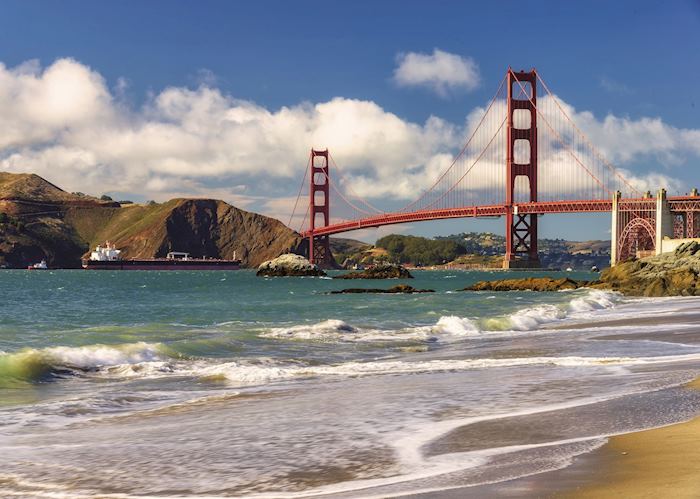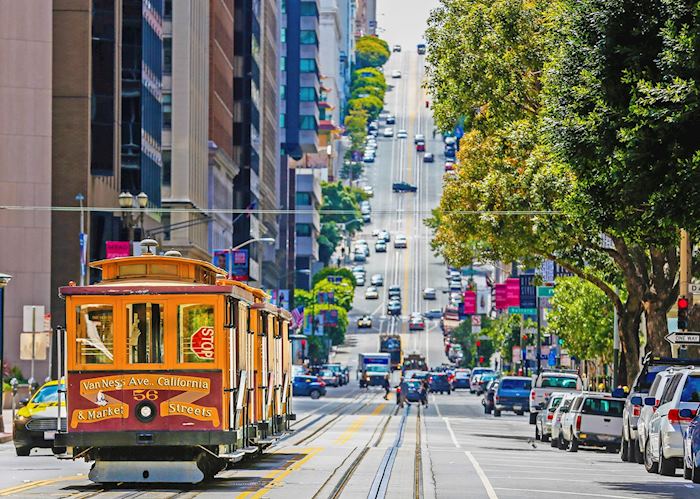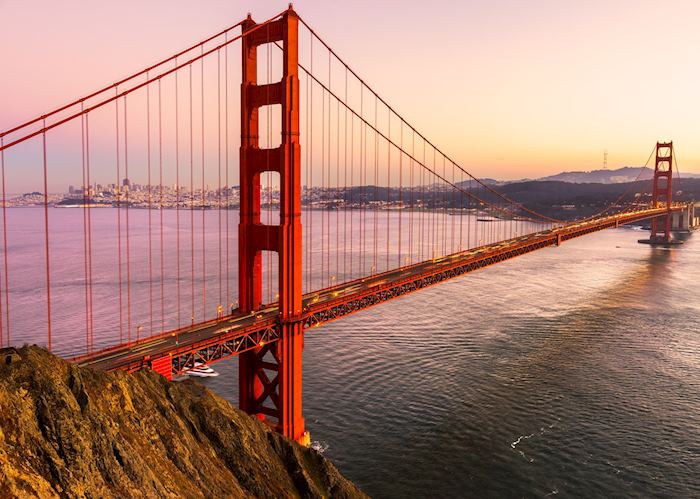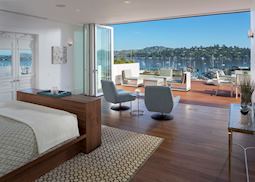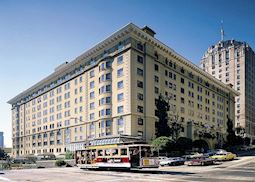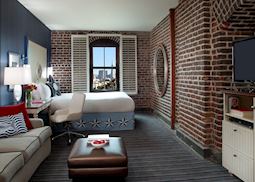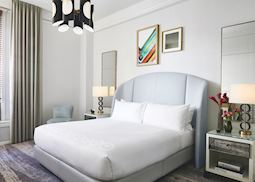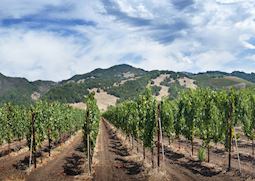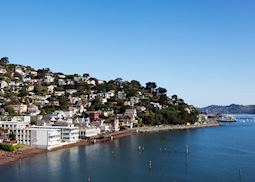Jump to:
Shaped by Spanish colonists, Gold Rush pioneers and devastating earthquakes, today San Francisco is home to a diverse mix of cultures. Alongside the Hispanic Mission District and Japantown, you’ll find North America’s oldest Chinatown, where you can sample dim sum and browse shops selling Oriental trinkets.
The city’s position adds to its charm, clustered on steep hills at the tip of a peninsula, surrounded by the waters of San Francisco Bay and the Pacific Ocean. Cycling over Golden Gate Bridge gives you views over the waves and the city skyline, while Fisherman’s Wharf is lined with seafood restaurants and home to basking sea lions. Offshore, you can tour Alcatraz or sail across the bay aboard a racing yacht.
USA specialist TomI’m always surprised by how much there is to see and do in San Francisco. Excluding the main sites, there are lesser-known areas like Haight-Ashbury to explore, and unusual experiences to enrich your visit, like sailing across the bay aboard a racing yacht.
Things to see and do in San Francisco
Alcatraz: step inside an abandoned prison cell
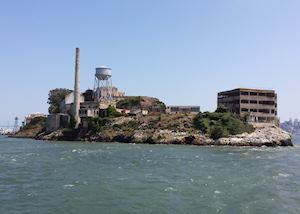 Alcatraz Island, a craggy knuckle of rock just 2 km (1.25 miles) offshore, is synonymous with its former prison, which for nearly 30 years held captive some of the USA’s most notorious criminals. The island has also been the site of a Civil War fort and military prison, and was occupied by a group of protesting Native Americans in the 1970s — their graffiti is still on the buildings.
Alcatraz Island, a craggy knuckle of rock just 2 km (1.25 miles) offshore, is synonymous with its former prison, which for nearly 30 years held captive some of the USA’s most notorious criminals. The island has also been the site of a Civil War fort and military prison, and was occupied by a group of protesting Native Americans in the 1970s — their graffiti is still on the buildings.
During the boat ride over to the island from Fisherman’s Wharf, the prison buildings gradually come into focus. Your tour begins with a 45-minute audio presentation, featuring the recollections of correctional officers who worked here and the prisoners they guarded.
The rest of the time is yours to explore the prison independently — you can stand inside some of the cells, which still feature the belongings of former occupants, see the showers where new inmates washed before donning their uniforms, and read tales of attempted breakouts.
The Golden Gate Bridge: walk or cycle across a landmark
Stretching across the 1.6 km (1 mile) wide Golden Gate Strait, the Golden Gate Bridge’s rust-red frame is visible from various points around the city. However, to get a true sense of its scale we recommend joining a guided bicycle tour.
Starting from Fisherman’s Wharf, you cycle 6.4 km (4 miles) along the bay’s shoreline to the bridge, passing the Presidio (a park and former military fort), the marina and Crissy Field (a former US Army airfield). As you pedal along the bridge’s cycle path, you have sweeping views over the city and can gaze up at the huge towers holding the suspension cables in place.
Once on the other side, you’ll stop at Vista Point to take in views of the bridge, the water and the distant city skyline. It’s then on to the affluent suburb of Sausalito, where the tour ends. You’re free to browse shops and art galleries before catching the ferry back to Fisherman’s Wharf.
Fisherman’s Wharf: see Pier 39’s resident sea lions
From restaurants serving the day’s catch to aquariums, museums and sea lions, Fisherman’s Wharf is a hive of activity. It was brought to life in the early 20th century by Italian and Chinese immigrants, who made their living catching fish and selling them along the wharf.
You can spend a morning strolling along the wharf and soaking up its atmosphere, enjoying fresh chowder for lunch and watching street performers entertain passers-by. The most popular spot with visitors, though, is Pier 39. While there are two tiers of restaurants, shops and entertainment venues, the main draw is its resident sea lion colony.
Sea lions first began appearing here in 1989, and their numbers grew so large that boat owners eventually abandoned the pier to them as a space to bark and bask in the sun. You can watch them lazing on top of one another, occasionally shuffling into the water to cool down. A Sea Lion Center overlooks the colony and provides information about the animals through interactive displays and videos.
Chinatown: experience a snapshot of Chinese culture
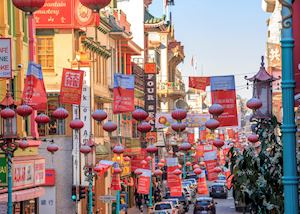 Passing through the traditionally styled Dragon Gate that marks the start of San Francisco’s Chinatown, it feels like you have been transported to mainland China. Reds and yellows dominate shop fronts, which are marked by neon signs, and paper lanterns are strung across the road. The smell of dim sum and the hiss of wok-fried noodles fill the air as you pass by the many Chinese restaurants.
Passing through the traditionally styled Dragon Gate that marks the start of San Francisco’s Chinatown, it feels like you have been transported to mainland China. Reds and yellows dominate shop fronts, which are marked by neon signs, and paper lanterns are strung across the road. The smell of dim sum and the hiss of wok-fried noodles fill the air as you pass by the many Chinese restaurants.
Established in 1848, this is North America’s oldest Chinatown, and it’s home to the largest Chinese community outside Asia. Strolling through it, you can browse shops selling silk Mandarin gowns and watch street musicians playing Chinese instruments such as the pipa (a pear-shaped lute) and guqin (a seven-stringed guitar-like instrument).
There are also quieter areas, such as Portsmouth Square, where local Chinese residents can sometimes be found performing t'ai chi or playing mahjong.
San Francisco Bay sailing: join the crew of an America’s Cup class yacht
A boat cruise on San Francisco Bay allows you to take in views of the city and Golden Gate Bridge from a different perspective. While there are lots of boat operators along Fisherman’s Wharf, we recommend a two-and-a-half-hour sail aboard the USA 76. This sleek racing yacht was used by the racing syndicate Oracle Team USA to prepare for the 2003 America’s Cup in New Zealand, in which they were finalists.
During your sailing experience, you’ll have the chance to help the experienced crew operate the vessel, from assisting with the hoist to taking turns as a ‘grinder’ on the big sail trim controls. Alternatively, you can just sit back and enjoy gliding through the water while taking in the bay’s natural beauty.
The yacht has room for up to 20 guests and four crew members, making this an intimate experience.
Lombard Street: ‘the most crooked street in the world’
Around 15 minutes’ walk south of Fisherman’s Wharf, Lombard Street zig-zags its way down one of the city’s steep inclines. With a total of eight hairpin bends snaking through landscaped bushes and flower beds, the street draws in visitors who want to get a photograph or experience driving down the winding road.
We suggest walking up the steps, which are shaded by leafy trees, to the side of the road. From the top of the street, you have sweeping views down across the city and out to the blue waters of San Francisco Bay.
San Francisco’s cable cars: a traditional way to explore
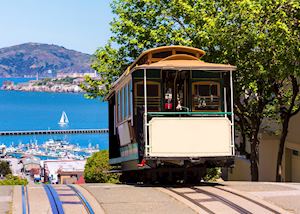 Tramping the hilly streets of San Francisco can get tiring, but the city offers a novel way of exploring its sights while resting your feet. Its historic cable car system — the last manually operated system in the world — has been in place since 1873, though just three lines remain.
Tramping the hilly streets of San Francisco can get tiring, but the city offers a novel way of exploring its sights while resting your feet. Its historic cable car system — the last manually operated system in the world — has been in place since 1873, though just three lines remain.
Riding in traditional, open-sided cable cars driven by a skilled ‘gripman’, you can travel between attractions such as Fisherman’s Wharf, Chinatown, Union Square (the city’s main shopping area) and Lombard Street.
While it’s probably not the most cost-effective form of transportation, it’s a fun and easy way to get around, and day tickets are available for multiple trips. Depending on how busy it is, you can choose to either sit inside the car or stand by one of the open sides gripping a rail, taking in the breeze as you glide up and down the streets.
Haight-Ashbury: the birthplace of the 1960s hippie movement
Encapsulating San Francisco’s liberalism, this district is most known for having sparked the 1960s hippie counterculture that swept the nation, culminating in 1967’s Summer of Love. Today, you’ll still find streets lined with independent bookshops, cafés and vintage clothes boutiques.
Bohemians flocked here in the 1960s, attracted by the relatively cheap and widely vacant housing. Their liberal way of life drew media attention, and soon people were journeying from far and wide to join the movement. Psychedelic musicians such as Janis Joplin, Jefferson Airplane and the Grateful Dead all lived nearby, their songs capturing the mood of the time.
Visiting this area of the city takes you away from the busier hubs. You could enjoy a picnic in Buena Vista Park in the heart of the district, where you have elevated views over the city skyline. Or take a stroll past Haight-Ashbury’s distinctive ‘painted ladies’ — rows of Victorian-era townhouses whose exteriors have been painted in vibrant reds, blues, yellows and greens to enhance their architectural details.
Best time to visit San Francisco
While in the summer (May to September) this part of California’s coast is prone to fog rolling in from the ocean, the warmth of the sun generally clears it by mid-morning. Temperatures are much higher than in the winter, when it’s often cloudy and rainy. There are also more activities available in San Francisco during the summer, from sailing out on San Francisco Bay to alfresco dining.
Festivals, events and seasonal reasons to visit
- Chinese New Year, in January or February, sees big celebrations take place in San Francisco’s Chinatown, including acrobatic dragons, stilt walkers and a treasure hunt.
- The USA’s baseball season runs from April to September, and you can enjoy the thrill of watching the San Francisco Giants at the AT&T Park, South Beach.
- On the second Sunday of June each year, the Haight-Ashbury Street Fair celebrates the cultural history and diversity of the district with live music, arts and crafts, and food stalls.
- The city comes alive for the 4th of July celebrations, with live music, a variety of family-friendly activities and fireworks by the bay.
- A two-day jazz festival takes place every October on Fillmore Street, where musicians such as Ella Fitzgerald and Billie Holiday performed during the 1940s. Live performances are spread across three stages and stalls sell artwork and street food.
who's been there
Start planning your tailor-made trip to San Francisco by contacting one of our California specialists
-
617-223-4521617-223-4558
- Make an inquiry
Suggested itineraries featuring San Francisco
Our itineraries will give you suggestions for what is possible when you travel in San Francisco, and they showcase routes we know work particularly well. Treat them as inspiration, because your trip will be created uniquely by one of our specialists.
Places near San Francisco
- Sonoma 37 miles away
- Napa Valley 38 miles away
- Sacramento 76 miles away
- Monterey 87 miles away
- Carmel 89 miles away
- Big Sur 110 miles away
- Mendocino 130 miles away
- Yosemite National Park 157 miles away
- Lake Tahoe 159 miles away
- Pismo Beach 208 miles away
- Kings Canyon National Park 221 miles away
- Eureka 229 miles away
- Sequoia National Park 231 miles away
- Trinidad 246 miles away
- Santa Barbara 278 miles away
- Crescent City 292 miles away
Photos of San Francisco
Accommodation choices for San Francisco
We've selected a range of accommodation options for when you visit San Francisco. Our choices usually come recommended for their character, facilities and service or location. Our specialists always aim to suggest properties that match your preferences.
-
![Alexandrite Suite Casa Madrona, San Francisco]()
Casa Madrona Hotel & Spa
San Francisco -
![The Stanford Court Hotel, San Francisco]()
The Stanford Court Hotel
San Francisco -
![Argonaut, San Francisco]()
Argonaut
San Francisco -
![Galleria Park King Guest Room]()
Galleria Park Hotel
San Francisco -
![The Fairmont San Francisco, San Francisco]()
Fairmont San Francisco
San Francisco -
![Omni San Francisco Exterior Night]()
Omni San Francisco Hotel
San Francisco
Ideas for experiencing San Francisco
Our specialists seek out authentic ways to get to know the places that could feature in your trip. These activities reflect some of the experiences they've most enjoyed while visiting San Francisco, and which use the best local guides.
-
San Francisco — Wine Country Tour ![Vineyard in the Sonoma Valley]()
San Francisco — Wine Country Tour
San Francisco — Wine Country Tour
Sonoma and Napa counties' Mediterranean climate makes them the premium wine grape-growing regions of the USA.
View details -
Chinatown Walking Food Tour ![Chinatown, San Francisco]()
Chinatown Walking Food Tour
Chinatown Walking Food Tour
Learn about Chinese tea, explore the markets on Stockton Street, and see fortune cookies being made at the Golden Gate Fortune Cookie Factory on this guided tour of San Francisco’s Chinatown.
View details -
Bike the bay & Golden Gate Bridge ![Sausalito, San Francisco]()
Bike the bay & Golden Gate Bridge
Bike the bay & Golden Gate Bridge
This three hour tour begins in Fisherman’s Wharf where you will be provided with a current year model bike with front handlebar bag, rear gear rack, and city map.
View details
